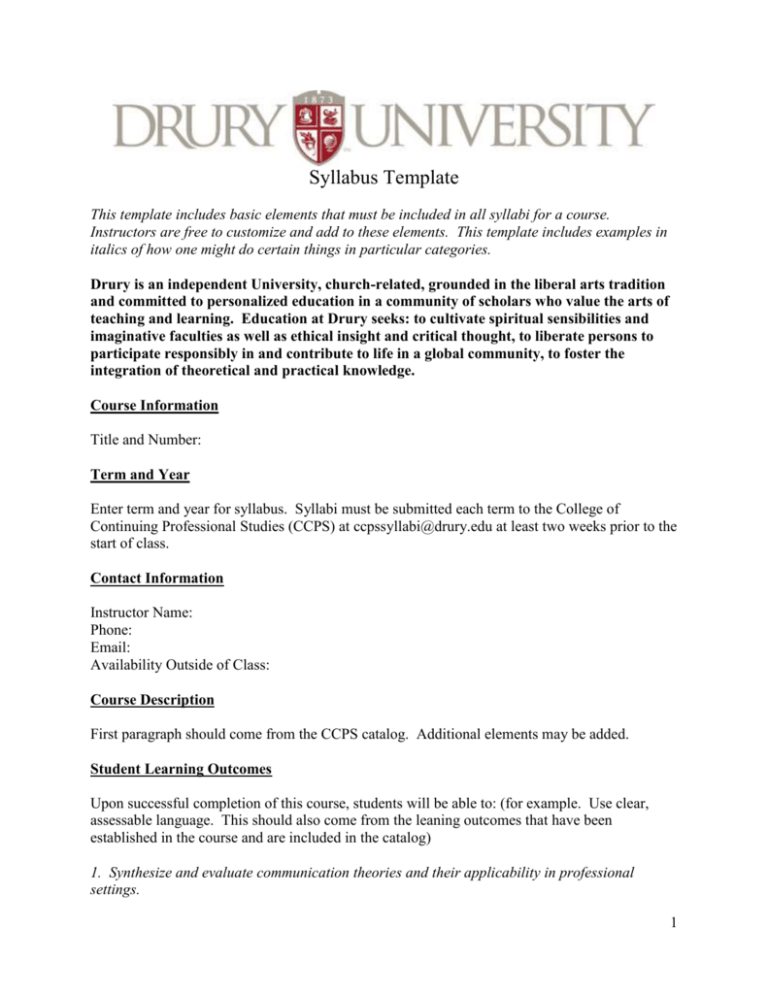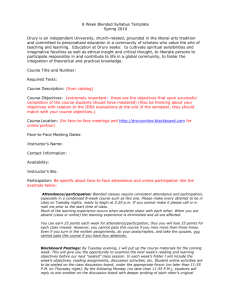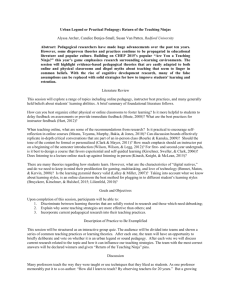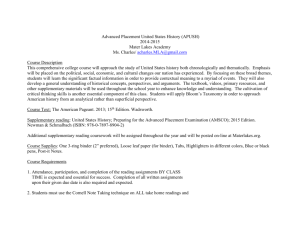Foundations of Communication Studies COM 1200
advertisement

Syllabus Template This template includes basic elements that must be included in all syllabi for a course. Instructors are free to customize and add to these elements. This template includes examples in italics of how one might do certain things in particular categories. Drury is an independent University, church-related, grounded in the liberal arts tradition and committed to personalized education in a community of scholars who value the arts of teaching and learning. Education at Drury seeks: to cultivate spiritual sensibilities and imaginative faculties as well as ethical insight and critical thought, to liberate persons to participate responsibly in and contribute to life in a global community, to foster the integration of theoretical and practical knowledge. Course Information Title and Number: Term and Year Enter term and year for syllabus. Syllabi must be submitted each term to the College of Continuing Professional Studies (CCPS) at ccpssyllabi@drury.edu at least two weeks prior to the start of class. Contact Information Instructor Name: Phone: Email: Availability Outside of Class: Course Description First paragraph should come from the CCPS catalog. Additional elements may be added. Student Learning Outcomes Upon successful completion of this course, students will be able to: (for example. Use clear, assessable language. This should also come from the leaning outcomes that have been established in the course and are included in the catalog) 1. Synthesize and evaluate communication theories and their applicability in professional settings. 1 2. Identify short and long term communication goals that account for different people in particular situations. 3. Design communication strategies that manage or resolve conflict. 4. Apply communication skills that promote conflict management and resolution. You may list additional learning outcomes. Course Materials Textbooks, required and optional, as well as supplementary reading and use of learning resources beyond the textbook such as course website, software, field trips, guest speakers, service learning projects and videos. These may be specified in general terms if the instructor has not yet determined exactly which additional resources will be used. For example, “The course will feature several local professionals as guest speaks” or “In addition to the course readings, we will view and discuss two or three documentaries.” Details, if known at the time of the planning of the syllabus, may be included in the schedule of events. If the instructor is going to require students to participate in activities at times other than the course meeting time, this should be specified in the syllabus. Include the following textbook: Brinkman, R, and Krischner, R. (2002). Dealing with people you can’t stand. New York: McGraw-Hill. Barsky, A. B. (2007). Conflict resolution for the helping professions. Belomont, CA.: Thomson Brooks/Cole. Fisher, R., Kopelman, E., and Kupfer Schneider, A. (1996). Beyond Machiavelli. New York, NY: Penguin. Class Policies Insert rules regarding class preparation and participation, classroom decorum, make-up examinations and quizzes, late papers, etc. University Tobacco-Free Policy Tobacco use of any kind, or use of the following products, including but not limited to cigarettes, smokeless tobacco, e-cigarettes, snus, hookah, or any other tobacco product is prohibited on campus and inside University-owned vehicles. The policy is enforceable for all general use and academic buildings, residence halls and apartment-style housing, athletic facilities, open air spaces, and common areas. 2 Attendance Insert your attendance policy here. There is no class-cut system at Drury. Students are expected to attend all classes and laboratory periods for which they are enrolled. An absence is an individual matter between student and instructor. Students are directly responsible to instructors for class attendance and for work missed during an absence for any cause. Academic Honesty Academic dishonesty undermines the values of Drury University as well as the educational endeavor. Dishonesty and theft of any kind are not to be tolerated, but the act of cheating in academic work is detrimental to the educational process and ultimately cheats both the student involved and the entire community of scholars. All instances of academic dishonesty will be reported to the Dean of the College of Continuing Professional Studies. Please refer to the CCPS catalog for more thorough review of the university’s academic dishonesty policy. ADA Students Drury University is committed to providing a hospitable environment to qualified students with disabilities and to complying fully with Section 504 of the Rehabilitation Act and the Americans with Disabilities Act. Services for students with disabilities enrolled in the College of Continuing Professional Studies are coordinated by the Coordinator of Disability Services, Bay Hall room 133, (417) 873-6881. Grading Scale Instructor add a numerical scale and indicate whether plus or minus grades will be given (i.e.): A 93 A- 90 B+ 87 B 83 B- 80 C+ 77 C 73 F Below 72 GRADE A B C D S F I CRITERIA AND GUIDELINES A grade of "A" involves a level of performance that is conspicuously excellent in the factors indicated in the definition of "B." A grade of "B" indicates a higher level of performance than the satisfactory standard defined for a grade of "C." It involves excellence in some aspect of work, such as completeness, accuracy, detail of knowledge, or effective independent work. A grade of "C" represents a satisfactory level of performance which can be expected of any Drury student who gives a reasonable amount of time, effort and attention to the work of the course. Such satisfactory performance should include familiarity with the concept of the course as shown by an acceptable mastery of the information, concepts of skills involved and regular participation in the work of the class. A grade of "D" indicates below standard performance; it is acceptable toward graduation only if offset by superior work in other courses. A grade of "S" (satisfactory) indicates the attainment of a "C" level or better. A grade of "F" indicates an unacceptable level of performance. A grade of "I" is given for incomplete work only if illness or other unavoidable 3 U IP, DR, DP,DF, WP, WF causes prevent the student from completing the course. The student is responsible for contacting the instructor and determining what must be done to remove the "I" grade. Coursework must be completed and the "I" grade replaced with a letter grade within six weeks after the beginning of the semester immediately following the semester in which the "I" was received. See catalog for complete “I” grade policy. A grade of "U" (unsatisfactory) indicates an unacceptable level of performance. See catalog. Note Drury does not give A+ grades as a final, end of semester grade. Weighting of Assignments: List the required assignments, due dates and point values for the course. ASSIGNMENT Group Project Mid Term Written Summary of each chapter (10 chapters @ 10 points each) Class participation/ Exercises (10 points per week) Individual Final Presentation Final Exam Total POINTS 250 100 100 150 200 200 1000 Methods of Evaluation Assignments and mode of evaluation; i.e., explanation of what the major assignments in the class are and how the student will be accountable for them (e.g. quizzes, examinations, term papers, oral presentations, or other assignments.) Faculty are advised to be specific about modes of accountability as well as about the relative value of each in the calculation of the final course grade. Assignments should map onto learning outcomes. 1. 2. 3. 4. 5. Reading Logs (eight of them) (LO 1) Group Dynamics Exercise (LOs 2, 3, 4) Midterm Examination (LOs 1, 2, 3) Mediation Exercise (LOs 3, 4) Reaction Papers (2 of them) (LOs 1, 2) 20% 20% 20% 20% 20% Reading Logs For eight of the weeks for which readings are assigned, students will write a short paper examining the assigned readings. Write about something that interests you because it is 4 refreshing, applicable to something you find relevant, unclear, or unconvincing. Papers are due at the beginning of class, typed, double-spaced, and copied to everyone. Midterm Examination The midterm examination will consist of a combination of forced choice (true/false, multiple choice, and matching) and open ended questions. Questions will be drawn from lectures, readings, and discussions. A study guide will be available in class one week prior to the exam. Exercises The Group Dynamics and Mediation exercises are role-play simulations in class that are designed to assess your ability to assimilate and utilize the topics of our readings and assignments. Detailed instructions on each exercise will be provided prior to the assignment. Reaction Papers Following each exercise, you will write a paper where you reflect on what your objectives were and how you prepared, the effectiveness of your presentation of the opening statement, and what you learned from the assignment. All papers are to be typed and in proper APA style. Margins are 1” all around and font is to be 12-point Times New Roman. Tentative Schedule Schedule of events: a chronology of class events and out-of-class readings, day-by-day, week by week, or unit by unit. Summary of important dates are deadlines for the semester, including holidays and the date of the final examination. Week 1 Course Overview Read Barsky, pp. 1-36; Brinkman & Kirschner, pp. 3-34 Week 2 Personal Dynamics—Perception and Personality Read Barsky, pp. 37-64; Read Brinkman & Kirschner, pp. 35-52 Week 3 Relational Dynamics—Integration, Conflict, and Change Read Brinkman & Kirschner, pp. 53-66; Kopelman & Schneider, pp. 1-41 Week 4 Nonverbal Communication Read Barsky, pp. 118-129; Kopelman & Schneider, pp. 42-94 Week 5 Language and Expression Read Barsky, pp. 130-159; Kopelman & Schneider, pp. 95-119 Week 6 Listening, Notetaking, and Paraphrasing Read Brinkman & Kirschner, pp. 67-110; Kopelman & Schneider, pp. 120-144 5 Week 7 Group Dynamics Exercise Week 8 Midterm Examination Week 9 Facilitation--Roles, Planning, and Process Read Brinkman & Kirschner, pp. 111-134; Barsky, pp. 185-229 Week 10 Culture, Gender, and Difference Read Brinkman & Kirschner, pp. 134-156; Barsky, pp. 230-242 Week 11 Questions and Questioning Skills Read Brinkman & Kirschner, pp.157-174; Barsky, pp.254-291 Week 12 Framing and Reframing Read Brinkman & Kirschner, pp.175-190; Barsky, pp. 299-315 Week 13 Dealing with Difficult People Read Brinkman & Kirschner, pp. 191-215 Week 14 Mediation Exercise Week 15 Course Synthesis 6







